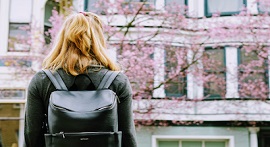For nearly two centuries Southwestern University has stood proudly as one of the nation's oldest and finest liberal arts institutions. Our beautiful, tree-lined residential campus encompasses more than 700 acres featuring spacious sports and recreational facilities, multiple research laboratories, two live-performance theaters, and countless outdoor places to study, relax or socialize.
Recognized for our commitment to sustainable, eco-friendly practices, our campus was one of the first in the nation to meet 100 percent of its electric needs from renewable wind power, and since 1972 we've nourished our landscapes and athletic fields with recycled water.
Throughout campus and in the world beyond our students make meaningful connections across disciplines, cultures, and experiences through our unique Paideia approach—a curriculum that allows to students to chart a course that best suits their passions and life goals as they develop creative, critical thinking skills that make them adaptable to any challenge or opportunity. The results are impressive: less than a year after graduation, 98 percent of Southwestern students are either employed, attending a professional school or pursuing advanced studies.
But while you're at Southwestern you should also know you have the best of all worlds for some good times, whether it's a relaxing stroll through Georgetown's historic town square, spending a day on the crystal-clear San Gabriel River, or enjoying an evening reveling in Austin's live music scene. A bright future begins here, right in the heart of Texas.
"Southwestern University helped me challenge myself, explore my found and unfound passions, and learn what I was truly capable of. SU is a special place where thinking and learning lead to developing skills that will last you a lifetime. The University gave me the community and the environment that nurtured my creativity and enabled me to flourish." — Caden Cox '22, Communication Studies
Southwestern University
1001 E. University Avenue
Georgetown, TX 78626
Telephone: 800.252.3166
Email: admissions@southwestern.edu
Website: southwestern.edu
About
From the School
Contact & Visit
Campus Visits Contact
Dean of Admissions
PO Box 770
Georgetown, TX 78627-0770
Experience College Life
McCombs Center-Student Center
Sarofim School of Fine Arts
Academic Mall-grassy area in the middle of campus
Korouva Milkbar-student run coffee house
Wolf Ranch Shopping Center
6th St. in Austin
Lake Travis
Georgetown Square
Campus Tours
Weekdays 9am-5pm, Select Saturdays 9am-2pm
512-863-1200
Dates: Year-round
Times: Weekdays - 9am, 12pm, 3pm; Select Saturdays - 9am, 12pm
Average Length: 1 hour
On Campus Interview
Faculty and Coach Visits
Class Visits
Overnight Dorm Stays
Transportation
Admissions
Admissions
Overall
From The School
Southwestern uses a holistic review process when considering students for admission. In looking for engaged learners, we consider academic performance, including grades earned and challenging courses in areas of interest. In addition, strength and depth of writing samples, participation and demonstrated leadership in extracurricular activities, cogency and content of recommendations, and recognition or achievement in national programs allow us to determine how a student will fit within our community. SAT and ACT test scores are optional except in the case of international, home-schooled, and certain named-scholarship applicants. We value the opportunity to get to know students better through an optional interview.
Our mission is to treat all applicants fairly and with respect. In all cases, our decisions are reached by multiple individuals reviewing the application and voting in a manner they believe is in the best interest of both the student and the university. We take this responsibility seriously and recognize that we are helping to shape the futures of our applicants.
Students may choose to apply Early Decision (binding), Early Action, or Regular Decision based on the time frame that works best for the student. Students may apply by submitting a Common Application, an Apply Texas application, or Southwestern's application.
Transfer students—students who have completed at least one semester (12 hours or more) following high-school graduation—are welcomed during the fall and spring semesters and may apply using either the Common Application or Apply Texas. Students should submit an essay, an official high-school transcript, official college transcripts from all schools attended, and a college official's report. An individual interview allows transfer students to ask questions regarding course transferability.
To learn more, visit southwestern.edu/admission.
Career Services and Placement
Southwestern's Center for Career & Professional Development (CCPD) ranks in the top 20 in the nation for internships The Princeton Review. Students begin using career services during their first year to develop the skills needed to obtain a job or continue their postgraduate education. Our staff provide personalized coaching and innovative programs on important skills such as résumé writing, interviewing, and job search strategies. In addition, our Alumni Network Mentoring and PirateConnect programs empower students to develop their professional networks and receive insider advice through connections with alumni who share their intellectual and cocurricular interests.
Two-thirds of all Southwestern students participate in at least one internship during their college career—the most important factor in successfully achieving postgraduate employment—and 86% of our alumni are employed or in graduate or professional school within 10 months of graduating.
Overview
GPA Breakdown
Need to boost your grades? We can help.
Learn MoreSAT & ACT Test Scores
Testing Policies
Deadlines
Early Decision — November 1
Early Action — December 1
Regular — February 1
Other Admission Factors
Rigor of Secondary School Record
Class Rank
Academic GPA
Standardized Test Scores
Application Essay
Recommendation(s)
Selectivity Rating
Get a personalized plan for a competitive application from an admissions expert.
Learn MoreAcademics
Academics
Overall
From The School
Academic Programs
Southwestern promotes lifelong learning through an integrated liberal arts and sciences program that incorporates the humanities, fine arts, social sciences, and natural sciences. All students take a first-year seminar that sets the stage for critical thinking across the disciplines. Other requirements include social justice, foreign language and culture, and fitness. SU's Paideia philosophy encourages students to dig deeper and make connections between courses, culminating in a capstone experience. Our flexible curriculum enables students to pursue their passions and explore subjects outside their majors.
As a sociology and English double major explains, "It's nice to be able to get a taste of how others may see and understand the world in various other disciplines." Another student, a biology major, says "Southwestern encourages students to study different disciplines and explore their interests both in and out of the classroom. I'm able to be a student, a swimmer, and an artist, all at the same time."
SU provides multiple experiential-learning opportunities, such as study abroad, internships, community-engaged learning, and innovative research programs. Students broaden their perspectives through semesters abroad in London, Spain, Peru, and Argentina; internships in Austin and Washington, DC; and arts apprenticeships in New York City. At least half our students volunteer through campus organizations, alternative spring breaks, and courses with service components. Meanwhile, the King Creativity Fund provides grants to support innovative and visionary projects each academic year, and the annual Research and Creative Works Symposium provides an opportunity for students to present original work in an academic conference setting and collaborate closely with faculty researchers.
Majors and Degrees Offered
Southwestern's 26 academic departments offer 36 majors and 43 minors and seven pre-professional programs that prepare students for success in any career or personal endeavor:
Majors & Minors:
- Anthropology
- Applied Physics
- Applied Movement and Sports Studies*
- Architecture & Design Studies*
- Art (Studio)
- Art History
- Biochemistry
- Biology
- Business
- Chemistry
- Chinese*
- Classics
- Communication Studies
- Computational Mathematics
- Computer Science
- Data Analytics*
- Design Thinking*
- Early Modern Studies*
- East Asian Studies*
- Economics
- Education
- English
- Environmental Studies
- Feminist Studies
- French
- German
- Greek
- Health Studies*
- History
- Independent Major
- International Studies
- Kinesiology
- Latin
- Latin American & Border Studies
- Mathematics
- Music
- Neuroscience*
- Philosophy
- Physics
- Political Science
- Psychology
- Race & Ethnicity Studies*
- Religion
- Sociology
- Spanish
- Theatre
- * Indicates Minor Only
Pre-Professional Pathways:
- Pre-Dentistry
- Pre-Engineering
- Pre-Law
- Pre-Medicine
- Pre-Ministry
- Pre-Physical Therapy
- Pre-Veterinary Medicine
Faculty and Class Information
Graduation Rates
Majors
-
AREA, ETHNIC, CULTURAL, GENDER, AND GROUP STUDIES.
Latin American Studies.
Women's Studies.
-
BIOLOGICAL AND BIOMEDICAL SCIENCES.
Biochemistry.
Biology/Biological Sciences, General.
-
BUSINESS, MANAGEMENT, MARKETING, AND RELATED SUPPORT SERVICES.
Business/Commerce, General.
-
COMMUNICATION, JOURNALISM, AND RELATED PROGRAMS.
Speech Communication and Rhetoric.
-
COMPUTER AND INFORMATION SCIENCES AND SUPPORT SERVICES.
Computer and Information Sciences, General.
-
EDUCATION.
Education, General.
Music Teacher Education.
-
ENGLISH LANGUAGE AND LITERATURE/LETTERS.
English Language and Literature, General.
-
FOREIGN LANGUAGES, LITERATURES, AND LINGUISTICS.
Ancient/Classical Greek Language and Literature.
Classics and Classical Languages, Literatures, and Linguistics, General.
French Language and Literature.
German Language and Literature.
Latin Language and Literature.
Spanish Language and Literature.
-
HISTORY.
History, General.
-
MATHEMATICS AND STATISTICS.
Computational Mathematics.
Mathematics, General.
-
NATURAL RESOURCES AND CONSERVATION.
Environmental Studies.
-
PARKS, RECREATION, LEISURE, AND FITNESS STUDIES.
Kinesiology and Exercise Science.
-
PHILOSOPHY AND RELIGIOUS STUDIES.
Philosophy.
Religion/Religious Studies.
-
PHYSICAL SCIENCES.
Chemistry, General.
Physics, General.
Physics, Other.
-
PSYCHOLOGY.
Psychology, General.
-
SOCIAL SCIENCES.
Anthropology.
Economics, General.
International Relations and Affairs.
Political Science and Government, General.
Sociology.
-
VISUAL AND PERFORMING ARTS.
Art History, Criticism and Conservation.
Drama and Dramatics/Theatre Arts, General.
Fine/Studio Arts, General.
Music History, Literature, and Theory.
Music Performance, General.
Music Theory and Composition.
Musicology and Ethnomusicology.
Students Say
The closeness of faculty and students “creates a wonderful learning environment in which students are comfortable asking questions, going to office hours, and getting the specific help that they need.” Faculty “are very supportive and tend to be understanding when it comes to accommodations and late work, and it’s easy to build a relationship with them.” Research and practical experience are valued and there are many opportunities available to students throughout their college career. One example of this is student teaching, which “is an amazing opportunity as most schools only offer it your senior year.” The school and faculty facilitate experiential learning; “the Center for Professional Development is very helpful for student internships, networking, and jobs post-graduation,” and professors often “have incredible connections in their fields,” which can also result in internships and valuable career connections.
Degrees
Career Services
Alumni Network
Alumni Services
Interest Inventory
Internships
Regional Alumni
Experiential
Internship
Notable Faculty
Prominent Alumni
Academic Rating
Careers
Graduation Rates
Career Services
Alumni Network
Alumni Services
Interest Inventory
Internships
Regional Alumni
Experiential
Internship
ROI & Outcomes
Students Say
Tuition & Aid
Tuition & Aid
Overview
From The School
Tuition, Room, Board and Fees
Costs for the 2023-2024 Academic Year
Tuition & Fees: $51,058
Room and Board (approximate): $13,600
Books, Transportation, and Personal Expense: $2,900
Financial Aid
Offering a world-class liberal arts and sciences education, Southwestern provides an excellent return on investment. Scholarships, grants, and work–study help to offset the cost of college, with 99% of SU students receiving merit- or need-based aid.
Also, Every Southwestern University first-year is automatically awarded a scholarship based on class rank or their recalculated grade point average (GPA) in high school—whichever is higher. Scholarships range from $15,000 to $33,000.
Incoming students are evaluated for merit scholarships through a holistic review of the admission application. Need-based financial aid is awarded annually and requires the submission of a FAFSA prior to the year in which the student will enroll.
Dates
Required Forms
Financial Aid Statistics
Expenses per Academic Year
Available Aid
Need-Based College/University Scholarship or Grant Aid from Institutional Funds
Need-Based Federal Pell
Need-Based Private Scholarships
Need-Based SEOG
Need-Based State Scholarships
Direct Subsidized Stafford Loans
Direct Unsubsidized Stafford Loans
State Loans
Financial Aid Rating
Student Body
Student Body
Overall
From The School
Students excel at Southwestern in a rigorous environment that is challenging but also warm and supportive. Our 1,500 students thrive in a leafy, small-town residential setting, sharing in the excitement of learning and discovery while demonstrating a commitment to civic engagement and social justice. All SU students are encouraged to explore multiple niches in academics, extracurricular activities, and volunteering—you'll meet entrepreneurs who are also football players, chemists who are also opera singers, and computer scientists who are advocates for the environment.
"I love the small-campus feel of Southwestern," said a psychology major. "It has allowed me to build one-on-one relationships with my professors, create connections across campus, and make lifelong friends." Another student, a studio art major, said "I chose Southwestern in part because it's a small school, and I wanted to be able to get to know my professors. But my professors also got to know me. They've guided me, supported me, and believed in me throughout my time here."
Southwestern is home to 60+ student organizations, 24 club and intramural sports, 10 national fraternities and sororities, and numerous honor societies and special-interest groups. Our students discover new passions and develop their skills through engagement and leadership on campus. And our Mosaic initiative helps students reflect on and articulate the value of these co-curricular experiences.
Student Body Profile
Demographics
Students Say
Campus Life
Campus Life
Overview
From The School
Location
Located on 700 beautiful acres in the heart of Georgetown, Southwestern's towering live oak trees and early-20th-century buildings combine in a picturesque setting. However, the university's commitment to sustainability is also evident: since its transition to 100% renewable energy in 2010, SU has been ranked among the top environmentally responsible colleges in the U.S.
Stroll through our residential campus on any given day, and you'll see students studying on the Academic Mall, lounging in a hammock, or pedaling to class on one of our shared yellow Pirate bikes. The central dining hub on campus, Mabee Commons features a variety of meals, snacks, and drink choices, and the nearby coffee bar and grill, the Cove, is open late for playing pool or simply hanging out with friends. If you have a midnight craving, Provisions on Demand (POD) offers a variety of quick bites until 2 a.m.
Southwestern's location in Georgetown just north of metro Austin provides the best of all worlds. Just blocks from a charming downtown brimming with dozens of shops, restaurants, coffee houses and one of the most unique bookstores you'll find anywhere, the campus is also minutes away from a vibrant capital city not only known for its live music, Austin City Limits, and SxSW, but it also for its growing reputation as the "Silicon Valley of the South" and home to such tech companies as Tesla, Google, Apple, Samsung and Dell.
Campus Facilities & Equipment
Southwestern is undergoing more than $120 million in construction projects, including the renovation of historic Mood-Bridwell Hall, where we are blending 21st-century technology with the building's deep history. On the National Register of Historic Places, Mood-Bridwell will provide inclusive community gathering areas, performance spaces, new classrooms, and a coffeehouse.
On the east side of campus, construction will begin on a first-year, mixed-use residence hall and a new welcome center that will include study/lounge spaces and meeting rooms, a screening room, yoga and pilates studios, an art gallery, and a coffeehouse cafe. Work will also begin on a new, mixed-use residence hall for second-year students that will include amenities similar to those found in the first-year residence hall.
The McCombs Campus Center recently renovated its ballrooms as well as its spacious Bishops Lounge, and the dining and food service areas are also being extensively renovated in a multi-million dollar project.
Other campus buildings of note include the Fondren-Jones Science Center, which is the hub for Southwestern's Garey School of Natural Sciences. A recent renovation and expansion further integrates students and faculty throughout all STEM fields, enhancing active learning and collaboration. It features cutting-edge teaching laboratories, student?faculty research spaces, interdisciplinary learning studios, technology-enhanced classrooms, and spacious, comfortable study lounges.
The Corbin J. Robertson Center is Southwestern's 95,000-square-foot recreational and athletic facility. It houses a recently renovated indoor running track and renovated basketball and volleyball courts, a state-of-the-art weight room, cardio fitness studios, and an indoor swimming pool. Southwestern is also home to various athletic fields for football, baseball, softball, soccer, lacrosse, and intramurals. Also in the planning stages is a multi-use athletic complex that will feature a new football stadium.
The Smith Library gives students access to 400,000 volumes and 125 databases. In Special Collections, students can engage directly with historical manuscripts, records on Texas history and politics that are held exclusively at Southwestern, and even a cuneiform tablet from approximately 2000 BCE. The Smith Library also houses MakerSpace Studios, where campus community members can use 3-D printers, photography and video studios, a sound booth, and a media lab.
Campus Life
Housing Options
Disabled Student
Dorms Coed
Dorms Male
Frat Sorority
Students Say
Special Needs Admissions
Documentation Required for LD
Full psychoeducational evaluation report is strongly preferred, but an IEP or 504 plan showing history of accommodations for LD would also be acceptable.Documentation Required for ADHD
Verification of diagnosis and functional limitations from an appropriately licensed health provider (typically a psychiatrist or primary care physician). A full psychoeducational evaluation report would also be acceptable.Special Need Services Offered
Student Activities
Sports
Basketball
Cross Country
Diving
Football
Golf
Lacrosse
Soccer
Swimming
Tennis
Track Field Outdoor
Cross Country
Diving
Golf
Lacrosse
Soccer
Softball
Swimming
Tennis
Track Field Outdoor
Volleyball
Student Services
Womens Center
Air Force ROTC Offered at cooperating institutions: University of Texas - Austin
Sustainability
Data provided by Association for the Advancement of Sustainability in Higher Education (AASHE), STARS®, as of March, 2023.
Campus Security Report
The Jeanne Clery Act requires colleges and universities to disclose their security policies, keep a public crime log, publish an annual crime report and provide timely warnings to students and campus employees about a crime posing an immediate or ongoing threat to students and campus employees.
Please visit The Princeton Review’s page on campus safety for additional resources: http://www.princetonreview.com/safety
The Princeton Review publishes links directly to each school's Campus Security Reports where available. Applicants can also access all school-specific campus safety information using the Campus Safety and Security Data Analysis Cutting Tool provided by the Office of Postsecondary Education of the U.S. Department of Education: https://ope.ed.gov/campussafety/#/

















